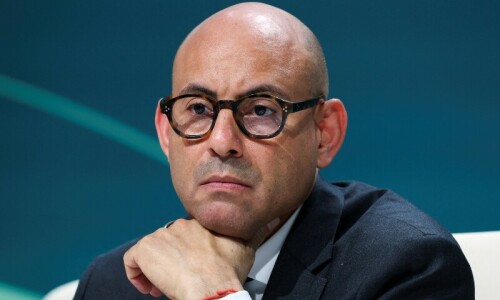JERUSALEM: The international community must demand that any future Egyptian government that takes power respect the 30-year peace treaty with Israel, Prime Minister Benjamin Netanyahu said on Tuesday.
“Israel believes that the international community must demand that any Egyptian government must preserve the peace treaty with Israel,” Netanyahu was quoted as saying in a statement from his office.
His comment came as Egypt battles a momentous tide of civil unrest, with hundreds of thousands of protesters calling for the overthrow of President Hosni Mubarak who has long been Israel's closest ally in the region.
Israeli media reported that Netanyahu held a meeting Tuesday with the heads of the country's intelligence and security services and members of his inner cabinet.
The meeting, an annual review, had been scheduled before the outbreak of protests in Egypt, but it focused heavily on the events unfolding in Israel's southern neighbour, the reports said.
Officials confirmed that Netanyahu held “security consultations,” but declined to provide further details.
Since the protests began last week, Israel has stressed its focus is to preserve regional stability and its peaceful relations with Egypt, with which it signed a treaty in 1979.
Egypt was the first Arab state to sign a peace treaty with Israel after four wars, initiating three decades of quiet on Israel's southern border.
Since then Cairo has played a key role in mediating between Israel and the rest of the Arab world and the Palestinians in particular.
Netanyahu has held frequent meetings with Mubarak since coming to office in 2009, more than any other world leader.
As such Israel has been hesitant to support the pro-democracy protests in Egypt.
Promoting democracy in the region could advance peace but it could also be exploited by extremist forces which would have the opposite effect, he said in a reference to Israel's fears that an Iran-style regime could arise in Egypt.
“Israel is a democracy and encourages the advancement of democracy in the Middle East,” Netanyahu said.
“But if this allows extremist forces to exploit the democratic process to come to power and further their anti-democratic goals, as we have seen in Iran and other places, the results will be damaging to peace and to democracy.”Netanyahu had on Monday raised the spectre of an Iranian-style regime led by extremists arising out of the chaos sweeping through Egypt.
In Iran, mass protests against the Western-backed shah erupted in January 1978 and he was forced out a year later, leaving a power vacuum that was grasped by the exiled Ayatollah Ruhollah Khomeini who returned to set up the Islamic republic.
Since then, the Tehran regime has become Israel's most virulent enemy, with its President Mahmoud Ahmadinejad repeatedly predicting the demise of the Jewish state. – AFP
















































Dear visitor, the comments section is undergoing an overhaul and will return soon.